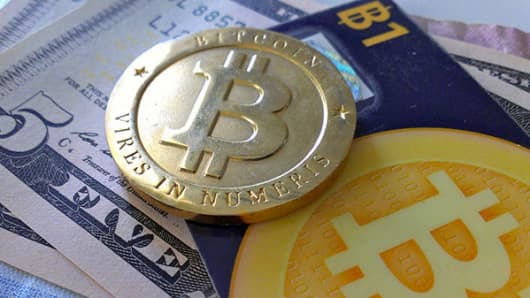Not too long ago, bitcoin was almost exclusively the legal tender of hackers. Today, thanks in part to the Cyprus bailout saga, it's known to investors everywhere.
While the digital currency has been around since 2009, it has largely stayed in the background—occasionally jumping onto people's radars but then fading away just as quickly.
With this latest round of interest, though, the bitcoin has been on a dizzying ride, with valuations fluctuating wildly. As investors scramble for as much as they can about this new type of money, they're finding that when it comes to virtual currencies, the rules of economics are less predominant than the rules of the hacker world.
(Read More: What Is Bitcoin?)
Bitcoins aren't cash, technically. They are virtual "tokens" that can be exchanged for goods and services from select retailers, contractors and online trading houses. Rather than going through a bank or financial institution, though, tokens are exchanged directly from person to person.
Since bitcoins are not based on any real world commodity, such as gold or a central bank, investing in them is not for the fainthearted. Instead, their value is based solely on the economic laws of supply and demand.
The tokens themselves are generated by an app that sits on users' computers and that trades the processing power of those machines (which is used to process transactions) for new bitcoins.
Every four years, the number of coins that will spring into existence—or be "mined"—will be cut in half, until the supply (a finite number of 21 million bitcoins) is exhausted around 2140. About 11 million bitcoins are in circulation now.
(Read More: Bitcoin Utopia? Interest Is Sky-High in This Euro Nation)
It is a slow process, though—very slow. In fact, mining a bitcoin takes so long that most users simply buy tokens via online currency exchanges, such as Mt. Gox or TradeHill.
But the difficulty of getting the tokens has created a subculture of hackers. Some distribute malware to unsuspecting computers, leeching some of their processing power to mine coins.
Others target the exchanges. And with the surge of interest in bitcoins, Mt. Gox reported it has become a refocused target of DDoS (denial of service) attackers.
Generally, whenever bitcoins begin to draw widespread interest, their value soars. Two years ago, following an exposé on Gawker (quickly piced up by other media), the value of bitcoins jumped to $28 from $1.
(Read More: Cyprus Says Threat Contained, No Plan to Leave Euro)
Until recently, bitcoins hovered in the $10 range, but post-Cyprus the fluctuations have been much more significant. At one point in early April, the value of a bitcoin topped $200, only to tumble the next day to just $100 and even lower the following day.
That makes it hard to keep up with the value of investments in the currency. The Winklevoss twins, for example, recently claimed to own $11 million in bitcoins. That's when the coins were worth $120 each, though—a number that has changed dramatically several times since.
Bitcoins' other growing pains include infrastructure woes. Exchanges are currently unable to support the volume of transactions that flooded them in April.
"Our system was designed to handle 2-3x our normal load, but now we're experiencing 10x the amount, which was difficult to prepare for (it takes weeks) with the sudden new accounts," Mark Karpeles, president and CEO of Mt. Gox, said on a Reddit "ask me anything" chat.
The problems aren't slowing interest, though. Karpeles says Mt. Gox has been seeing 20,000 new account signups per day recently, resulting in delays of up to two weeks in verifying the accounts.
Once users have an account, they set up a bitcoin "wallet," which stores their virtual coins and notes any transactions. Once it's filled, coins can be exchanged for a number of services, such as graphic design. Finding a real-world location that accepts them is harder, but several spots—ranging from a dentist in Kansas to a sushi joint in Cambridge, Mass.—are taking the currency.
(Due to the anonymous nature of transactions, people are also using bitcoins to buy illegal drugs via well-hidden websites, something that put them in the national spotlight in the first place.)
Assuming you find a place that takes them, you'll then open up your bitcoin wallet and digitally transfer the amount to an address the merchant provides. Rather than the typical "john@yahoo.com" addresses you're used to, though, the transfer address will be an illegible string of 30-40 randomly generated numbers and letters—eliminating the need to know who, exactly, you're doing business with—and giving users a limited form of anonymity.
Perhaps because of the limited number of establishments recognizing bitcoins, most people who mine or invest in them hold on to the currency rather than spend it. A study in October found that 78 percent of the active bitcoins in circulation are dormant.
The danger with that is if hackers target an account—or a wallet provider—it's very difficult for users to recover their investment, since bitcoin transactions are generally irreversible.
In early April, Instawallet, which branded itself as an "anonymous" bitcoin wallet site, was forced to suspend operations indefinitely after hackers stole nearly $4.6 million in the currency. The site later said it would open a claims system, refunding amounts of under 50 bitcoins within 90 days, assuming it received only a single claim on the account.
Larger refund amounts will be handled case-by-case, Instawallet said. All this uncertainty isn't scaring off notable investors, though. In addition to the Winklevii, a group of venture capitalists, including Andreessen Horowitz, announced in early April that they were financing a bitcoin-related company, OpenCoin. The bet they're all making is that the Wild West atmosphere of bitcoins will calm down and that this virtual currency will become more widely accepted, both by mainstream businesses and the consumers who frequent them.


